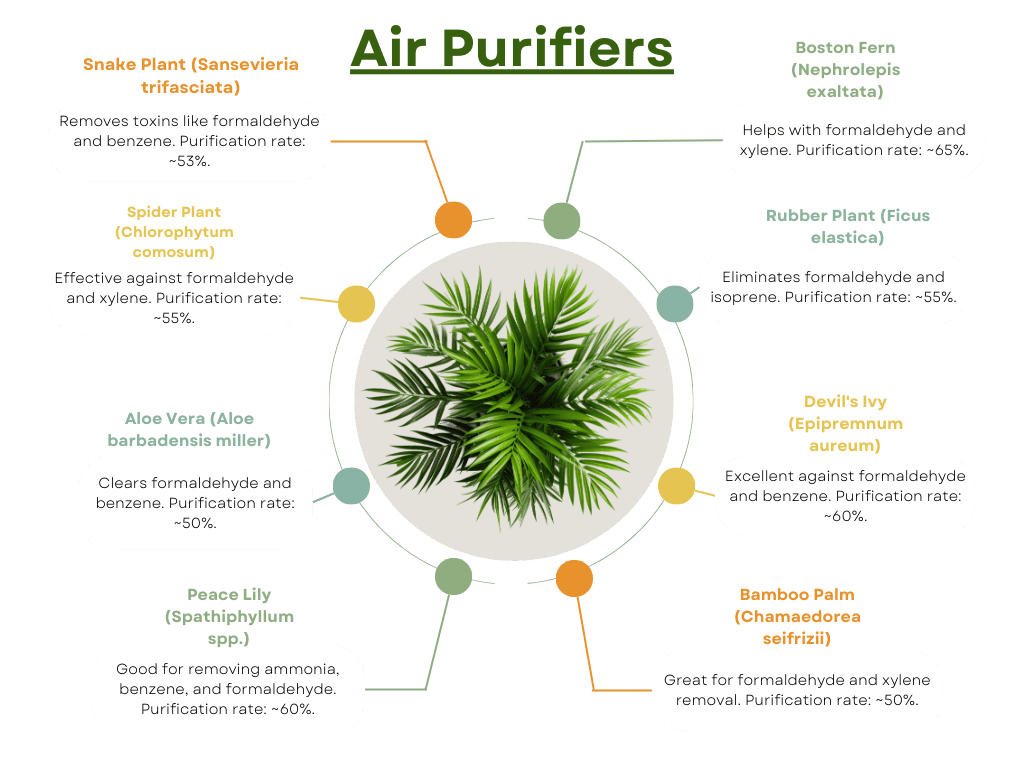Houseplants have been a popular addition to home decor for years, but did you know they can also enhance your well-being? Research has shown that plants positively impact both physical and mental health, making them a valuable addition to any living space.
One of the most well-known benefits of houseplants is their ability to purify the air. Plants absorb carbon dioxide and release oxygen, which can improve air quality and reduce the amount of harmful pollutants in the environment. This can significantly impact respiratory health and may even help reduce the risk of certain illnesses.
In addition to their air-purifying properties, houseplants have also been shown to positively impact mental health. Studies have found that being around plants can reduce stress, improve mood, and boost cognitive function. This makes them valuable to any space, whether a home office or a living room. With so many benefits, it’s easy to see why houseplants have become such a popular choice for those looking to enhance their well-being.
The Science Behind Houseplants and Well-Being

Houseplants are not just a decoration for your home or office; they also positively impact your well-being. The benefits of houseplants are backed by science and research, with studies showing that they can improve air quality, reduce stress, and boost productivity. This section will explore the science behind houseplants and their impact on well-being.
Photosynthesis and Air Quality
One of the main benefits of houseplants is their ability to improve air quality through photosynthesis. During photosynthesis, plants absorb carbon dioxide and release oxygen, which can help to freshen up the air in your home or office. In addition, houseplants can also absorb harmful toxins such as formaldehyde, volatile organic compounds (VOCs), dust, mold, and pollen, which can help to purify the air.
NASA’s Research on Houseplants
NASA researched the benefits of houseplants in the late 1980s to find ways to improve air quality in space stations. The research found that certain types of houseplants, such as snake plants, bamboo palm, Boston fern, aloe vera, lilies, spider plants, golden pothos, orchids, rubber trees, and Chinese evergreen, can effectively purify the air by removing toxins and pollutants.
The research also found that houseplants can help reduce stress and improve mood, which can positively impact overall well-being. In addition, houseplants can help to boost productivity and creativity, making them a great addition to any workspace.
In conclusion, the science behind houseplants and well-being is clear. Houseplants can improve air quality, reduce stress, boost productivity, and enhance well-being. Whether you want to add some greenery to your home or office or enjoy the many benefits of houseplants, there are plenty of options.
Health Benefits of Houseplants
Houseplants are not just a decorative addition to your home or office space. They also provide numerous health benefits that can enhance your overall well-being. In this section, we will discuss houseplants’ physical, mental, and environmental health benefits.
Physical Health Benefits
Houseplants have been shown to have several physical health benefits. They can improve air quality by reducing benzene, formaldehyde, and trichloroethylene pollutants. This is especially important for people who spend most of their time indoors. Plants also increase humidity levels, which can help alleviate respiratory problems and reduce the risk of allergies and asthma.
Studies have also found that caring for plants can positively impact physical health. For example, a study published in the Journal of Alternative and Complementary Medicine found that patients who had plants in their hospital rooms had lower blood pressure and heart rate, required less pain medication, and faster recovery after surgery than patients who did not have plants in their rooms.
Mental Health Benefits
Houseplants have been shown to have several mental health benefits as well. They can reduce stress, anxiety, and depression by creating a calming and relaxing atmosphere. Plants also promote positive emotions, such as happiness and contentment, and can help alleviate negative emotions, such as anger and sadness.
In addition, plants can improve focus, attention, and creativity. Studies have found that having plants in the workplace can increase productivity and reduce absenteeism. Plants can also help reduce loneliness and isolation, especially for people who live alone or work from home.

Environmental Health Benefits
Houseplants can also have environmental health benefits. They can improve indoor air quality by removing pollutants and increasing oxygen levels. This can help reduce the risk of respiratory problems and other health issues.
In addition, plants can help reduce the urban heat island effect, which is a phenomenon that occurs when cities are significantly warmer than surrounding rural areas. Plants can also help reduce noise pollution and provide a natural source of shade and cooling.
In conclusion, houseplants provide numerous health benefits that can enhance your overall well-being. They can improve physical health, mental health, and environmental health. Caring for plants and incorporating greenery into your home or office space can create a healthier and more enjoyable environment.
Houseplants and Productivity
Houseplants are not only aesthetically pleasing but can also positively impact productivity. Studies have shown that having plants in the workplace can increase productivity by up to 15%. Here are a few ways that houseplants can enhance productivity:
Houseplants in the Workplace
In an office setting, plants can improve air quality, reduce stress, and boost mood. This can lead to fewer employee sick days and increased focus and attention. Also, plants can reduce noise and create a more pleasant work environment.
One study found that employees with plants in their workspace were 12% more productive than those without. This could be because plants can improve concentration and attention to detail, making tasks easier to complete.
Houseplants in the Classroom
In a classroom setting, plants can have similar benefits. Studies have shown that students in classrooms with plants have higher test scores and are more attentive than those without plants. Plants can also reduce stress levels and improve well-being, creating a more positive learning environment.
Additionally, plants can be used as a teaching tool, allowing students to learn about biology and the environment hands-on. This can increase engagement and interest in the subject matter.
Incorporating houseplants into the workplace or classroom can have numerous benefits for productivity and well-being. Plants can create a more pleasant and productive environment by improving air quality, reducing stress levels, and boosting mood.

Therapeutic Effects of Gardening
Gardening is a popular hobby that offers numerous therapeutic benefits to individuals. This section will discuss two sub-sections that highlight the therapeutic effects of gardening.
Horticultural Therapy
Horticultural therapy is a type of therapy that involves using plants and gardening to improve an individual’s mental and physical health. This therapy has been found to be effective in reducing stress, anxiety, and depression. It also benefits individuals with mood disorders, such as bipolar disorder.
According to a study published on PubMed Central, gardening can alter EEG recordings, reduce stress, fear, anger, and sadness, and reduce blood pressure, pulse rate, and muscle tension. Another study found that viewing a green hedge rather than a concrete fence is more beneficial physiologically.
Horticultural therapy can be conducted in various settings, such as hospitals, nursing homes, and rehabilitation centers. It can also be conducted in community gardens, where individuals can work together to grow plants and vegetables. This therapy provides individuals with a sense of accomplishment and purpose, which can improve their overall well-being.
Gardening and Dementia
Gardening is beneficial for individuals with dementia. It provides them with a sense of purpose and accomplishment and can also improve their cognitive function. According to an article published in Psychology Today, gardening can enhance general well-being, reduce stress, and improve mood.
Gardening can also improve the physical health of individuals with dementia. It provides them with exercise, which can improve their mobility and reduce the risk of falls. Additionally, gardening can provide individuals with sensory stimulation, improving their overall quality of life.
In conclusion, gardening offers numerous therapeutic benefits to individuals. It can be used as a form of therapy to improve mental and physical health and benefit individuals with dementia.
Popular Houseplants and Their Benefits
Houseplants are a great way to add greenery to your home and improve your well-being. Here are some popular houseplants and their benefits:
Benefits of Specific Houseplants
Spider Plant
Spider plants are known for their air-purifying properties. They can remove harmful toxins such as formaldehyde and benzene from the air. They are also low maintenance and easy to care for.
Pothos
Pothos is another plant that is great for air purification. It can remove toxins such as formaldehyde and carbon monoxide from the air. Pothos is also easy to care for and can grow in low-light conditions.
English Ivy
English Ivy is a great plant for removing airborne mold. It can also remove formaldehyde from the air. English Ivy is easy to care for and can grow in low to medium light conditions.
Snake Plant
Snake plants are known for their ability to improve indoor air quality. They can remove toxins such as formaldehyde, benzene, and carbon dioxide from the air. Snake plants are also low maintenance and can grow in low-light conditions.
Bamboo Palm
Bamboo palms are great for removing airborne toxins such as benzene and formaldehyde. They are also effective at adding moisture to the air, which can help improve air quality. Bamboo palms require moderate to bright light and regular watering.
Boston Fern
Boston ferns are great for removing toxins such as formaldehyde and xylene from the air. They are also effective at adding moisture to the air, which can help improve air quality. Boston ferns require bright, indirect light and regular watering.
Aloe Vera
Aloe vera is a popular plant that is known for its healing properties. It can help soothe burns and cuts and is also great for improving indoor air quality. Aloe vera can remove toxins such as formaldehyde and benzene from the air.
Lilies
Lilies are great for adding color to your home and improving air quality. They can remove toxins such as formaldehyde and benzene from the air. Lilies require bright, indirect light and regular watering.
Golden Pothos
Golden pothos is a great plant for removing toxins such as formaldehyde and carbon monoxide from the air. It is also easy to care for and can grow in low-light conditions.
Orchids
Orchids are great for improving indoor air quality. They can remove toxins such as formaldehyde and xylene from the air. Orchids require bright, indirect light and regular watering.
Rubber Tree
Rubber trees are great for removing toxins such as formaldehyde from the air. They require bright, indirect light and regular watering.
Chinese Evergreen
Chinese evergreens are great for removing toxins such as formaldehyde and benzene from the air. They are also easy to care for and can grow in low-light conditions.
Monstera Deliciosa
Monstera deliciosa is a great plant for removing toxins such as formaldehyde from the air. It requires bright, indirect light and regular watering.
Chlorophytum Comosum
Chlorophytum comosum, also known as spider plant, is great for removing toxins such as formaldehyde and benzene from the air. It is also easy to care for and can grow in low-light conditions.
Lavender
Lavender is a popular plant that is known for its calming properties. It can help reduce stress and anxiety, and it is also great for improving indoor air quality.
Ferns
Ferns are great for adding some greenery to your home while also improving air quality. They can remove toxins such as formaldehyde and xylene from the air. Ferns require bright, indirect light and regular watering.
Cacti
Cacti are great for adding some color to your home while also improving air quality. They can remove toxins such as formaldehyde and benzene from the air. Cacti require bright light and minimal watering.
Mint
Mint is a popular herb that is great for improving indoor air quality. It can remove toxins such as formaldehyde and benzene from the air. Mint is also great for cooking and making tea.
Houseplants and Pandemic
The COVID-19 pandemic has had a significant impact on people’s mental health and well-being. Many people have experienced loneliness, stress, and anxiety due to social isolation and the uncertainty of the situation. Houseplants have emerged as a popular way to combat these negative emotions and improve well-being during the pandemic.
A study of more than 4,200 people found that houseplants brought emotional benefits to 74% of participants during COVID-19 lockdowns. Caring for plants can give people a sense of purpose and help them feel less stressed. Houseplants can also provide a connection to nature and a sense of joy and pride in caring for something living.
During the pandemic, people have spent more time indoors, and houseplants can help improve indoor air quality. Plants absorb carbon dioxide and release oxygen, which can help people breathe better and feel more energized. Houseplants can also help reduce stress by creating a calming environment that can improve mood and productivity.

Houseplants can be an excellent way to combat loneliness during the pandemic. Taking care of plants can provide a sense of companionship and responsibility, which can help people feel less alone. Houseplants can also be a source of pride and joy as people watch their plants grow and thrive.
Overall, houseplants have emerged as a popular way to improve well-being during the pandemic. They provide a connection to nature, improve indoor air quality, and combat loneliness and stress. Caring for houseplants can be a rewarding and fulfilling activity that can improve mental health and well-being.
Safety Considerations for Houseplants
While houseplants are generally safe to have around, there are a few safety considerations to keep in mind.
Toxicity
Some houseplants can be toxic to pets and humans. It is important to research the toxicity of a plant before bringing it into your home. The American Society for the Prevention of Cruelty to Animals (ASPCA) has a comprehensive list of toxic and non-toxic plants on its website.
Allergies
Houseplants can also trigger allergies in some people. If you have allergies, it is best to avoid plants that produce a lot of pollen, such as certain types of ferns and palms.
Cold and Flu
During cold and flu season, it is important to keep your houseplants clean and free of dust. Dust can harbor bacteria and viruses that can make you sick.
Carpets, Paint, and Inks
Carpets, paint, and inks can emit harmful chemicals into the air. Some houseplants, such as spider plants and peace lilies, can help purify the air by removing these chemicals.
Safety Tips
Here are a few safety tips to keep in mind when caring for houseplants:
- Keep plants out of reach of pets and small children.
- Wear gloves when handling plants, especially if you have sensitive skin.
- Wash your hands after handling plants.
- Use caution when repotting plants, as the soil can contain bacteria and fungi that can cause illness.
- If you notice any signs of illness in your pets or family members after bringing a new plant into your home, contact a veterinarian or healthcare provider immediately.
By following these safety considerations and tips, you can enjoy the benefits of houseplants while keeping your family and pets safe and healthy.
Frequently Asked Questions
What are the psychological benefits of indoor plants?
Indoor plants have been shown to have a positive impact on mental health by reducing stress and anxiety levels, improving mood, and increasing productivity. Studies have also shown that indoor plants can help to reduce symptoms of depression and improve overall well-being.
Which indoor plants are best for improving air quality?
Some of the best indoor plants for improving air quality include spider plants, peace lilies, snake plants, and bamboo palms. These plants are known for their ability to absorb toxins and pollutants from the air, helping to create a healthier indoor environment.
Do indoor plants really reduce stress?
Yes, studies have shown that indoor plants can help reduce stress levels by promoting feelings of relaxation and calmness. The act of caring for plants has also been shown to have a therapeutic effect, helping to reduce anxiety and improve overall well-being.
How do plants affect mental health?
Plants can have a positive impact on mental health by reducing stress and anxiety levels, improving mood, and increasing productivity. The act of caring for plants can also have a therapeutic effect, helping to reduce symptoms of depression and improve overall well-being.
What are the benefits of having plants in your home?
Some of the benefits of having plants in your home include improved air quality, reduced stress levels, improved mood, and increased productivity. Plants can also add beauty to your home and create a more relaxing and inviting atmosphere.
Can indoor plants improve your overall well-being?
Yes, indoor plants can help to improve overall well-being by promoting feelings of relaxation and calmness, reducing stress and anxiety levels, and improving mood. Plants can also help to improve air quality and create a more inviting and relaxing atmosphere in your home.


